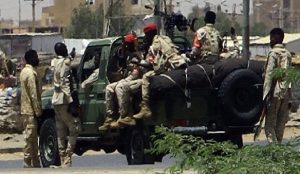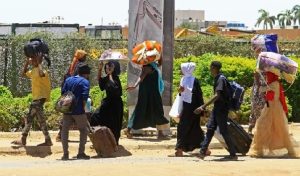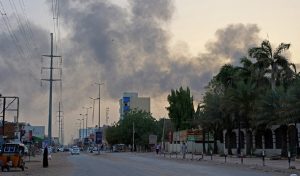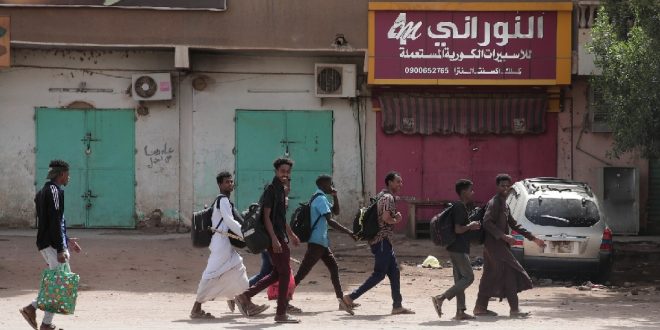21-04-2023
KHARTOUM: Ongoing fighting in Sudan’s capital is now severely affecting food supplies, as well as disrupting access to water and electricity, according to Khartoum residents who spoke to media.
 “We only have enough food for two days,” Nisreen Al-Saim said.
“We only have enough food for two days,” Nisreen Al-Saim said.
Ms Saim added that she and her family were now reducing the amount of food they consume in the hope that their supplies last longer.
Water and electricity cuts have affected many Sudanese homes since clashes began between the Rapid Support Forces (RSF) paramilitary group and the Sudanese army on 15 April.
The two sides had been sharing power with the head of the army, Gen Abdel Fattah al-Burhan, as de facto leader and the head of the RSF, Mohamed Hamdan Dagalo as his deputy, but they have since started fighting each other.
More than 270 people had died, according to a statement from the US embassy in Khartoum.
Shops shut down
In Bahri, northern Khartoum, eyewitnesses told media that the main water pumping station had been hit.
Hind, a local resident, said the frequent water outages forced her and her family to rely solely on their reserves of abri, a corn-based drink usually consumed during Ramadan – to quench their thirst.
Hind added that all the shops in her neighborhood had closed except for some bakeries, and even they had little flour left.
 A few days before the fighting started, the army had warned civilians to stockpile food following the deployment of RSF personnel to different points of the capital but Heba, another Khartoum resident, told media that “only a few families” took the advice seriously, as no-one imagined that the situation would escalate to the current extent.
A few days before the fighting started, the army had warned civilians to stockpile food following the deployment of RSF personnel to different points of the capital but Heba, another Khartoum resident, told media that “only a few families” took the advice seriously, as no-one imagined that the situation would escalate to the current extent.
“We did not want to go out in the heat as we had already stocked up on food for Ramadan,” Heba added.
UN aid suspended
However, Heba’s neighborhood is only getting power for two hours a day, which means the food that some families have stored may spoil.
It is not clear for how long supplies will have to hold out, given that there’s no clear end to the clashes.
Two ceasefires have been announced, but both collapsed as fighting continued between the warring factions.
Eyewitnesses reported that in the Khartoum neighborhoods where fighting has calmed enough for grocery stores to reopen, there are queues and products like bottled water are scarce.
 In others, residents are still too afraid to even leave their front door. Residents also reported that some shop owners in the Riyadh neighborhood, north of the capital, have increased their prices, sometimes charging up to twice the usual amount for eggs, meat, and drinks. “Some of them doubled their prices which is awful, while others are giving some food for free to help people in need,” said Shakir, a Khartoum resident.
In others, residents are still too afraid to even leave their front door. Residents also reported that some shop owners in the Riyadh neighborhood, north of the capital, have increased their prices, sometimes charging up to twice the usual amount for eggs, meat, and drinks. “Some of them doubled their prices which is awful, while others are giving some food for free to help people in need,” said Shakir, a Khartoum resident.
Shakir said he had heard similar report of price hikes in other Khartoum neighborhoods such as Azhari, Kafouri and Bahri.
“We are all hoping this conflict will end soon but stocks are running low, and families should decrease their daily consumption if they want to survive this,” he added.
Further complicating matters, the UN’s World Food Program (WFP) announced the suspension of aid provision to Sudan on 16 April following the death of three of its staff in the region of Darfur. (Int’l Monitoring Desk)
 Pressmediaofindia
Pressmediaofindia




